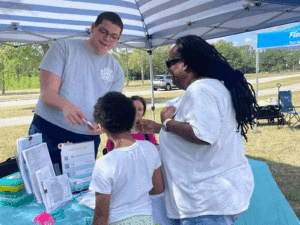All The Places You Should Not Go (On the Internet) by Alyona Loguntsova
The internet has given us access to a world of information, but it also presents a lot of dangers. Just like the real world, we need to know how to safely navigate digital spaces. We have been taught as kids to be wary of strangers, white vans, and dark alleys. However, as our world continues to change and move online, so do the tactics of predators and traffickers. So, this begs the question: what are the dark alleys and white vans of the internet?
Although children from the ages of 10 to 13 are the most at-risk for online exploitation, prevention begins with the awareness and proactive conversations with parents and educators. It is important for adults in positions of influence to understand the harsh realities of online exploitation and child trafficking and pass this information down to the children they interact with in ways they will understand.
Before the digital age, it was much easier to “not talk to strangers”. Today, a lot of the “friends” we interact with online are not people we actually know. In a world of photoshop, deep fakes, and AI, it is becoming harder than ever to know who is really on the other side of the screen. Because of this, it is increasingly important to understand what the warning signs on websites and apps are so we can learn to be more informed and which ones to avoid altogether.
We understand that it might feel impossible to understand the potential dangers of every platform that your children have access to. However, knowing the features that can take a platform from harmless to dangerous will help equip you to make accurate judgements about where your children spend their time online. At Paving the Way, we strongly recommend that parents, educators, and children look out for websites and games that include live voice- and/or video-chat and pay-for-services features, as well as platforms that have access to your location and camera roll.
According to Bark, the top apps flagged for sexual content in 2024 were Kik, X, Reddit, Tumblr, and Instagram. Other popular websites among children include Discord, Twitch, Minecraft, and Roblox. While none of these platforms are inherently evil, they do provide a fertile breeding ground for predators looking to take advantage of unaware and unsuspecting kids. Live chat features allow strangers to interact with each other with little to no real age verification or identity. Predators are aware of the games and lingo favored by children and use this information to lure them in and create a false sense of friendship and security. Traffickers will often befriend children on Minecraft and Roblox before inviting them to chatrooms on Discord to further their exploitative plans.
NBC reported that Discord had, “hidden communities and chat rooms, where adults have used the platform to groom children before trading child sexual exploitation material… and extort minors whom they trick into sending nude images before luring them out of the house to abduct them” (Goggin, 2023). Most of these platforms have servers that are only moderated by their members, cases of child grooming are often only detected after Child Sexual Abuse Material (CSAM) has already been shared.
The popular video-chat platform Omegle, with its infamous “Talk to Strangers” tagline, was shut down in 2023 following a lawsuit that alleged that “the service connected a girl, then 11, with a man who later sexually abused her” (Tolentino & Tenbarge, 2023). While this site was launched with the hopes of connecting strangers across geographical, cultural, and economical boundaries, it became an easy way for predators to take advantage of children and was “mentioned in more than 50 cases against pedophiles” at the end of its 14 year tenure (Liang & Tidy, 2023).
While this is a victory for child safety online, unfortunately, when you cut off the head of a monster, another one soon pops up to take its place. In this case, the new head was the Monkey app. Launched in 2016, Monkey gained immense popularity in 2023 following the shutdown of Omegle. Monkey offers a similar randomized video-chat service between strangers. Like many other social media platforms, it requires little to no age verification and “collects a large amount of personal data, including names, profile pictures, dates of birth, browser information, and IP addresses” which is shared with third parties (Popov, 2019). Furthermore, any user can record or screenshot video calls, adding to the danger of exploitation and potential spread of CSAM.
While awareness is the first step to prevention, there are further steps that parents, educators, and children can take to reduce risk of online sexual exploitation.
With Summer approaching, it’s a great time to create “non-screen’ events for the whole family things like; taking a walk or bike ride outside, having a family picnic inside, building forts for a family fun sleepover in the living room, learn new crafts, inviting friends over for game nights, create a ‘dream’ jar for future adventures and plan one!
Summer is a great time to slow down, to be with our kids and have empowering conversations. As a friend of ours with HSI says, ‘let’s make our kids hard targets’, meaning when they feel loved, seen, heard and appreciated they are less vulnerable to outside influences – online or in person.
Enjoy your Summer! ❦
https://www.bark.us/annual-report-2024/
https://www.nbcnews.com/tech/social-media/discord-child-safety-social-platform-challenges-rcna89769
https://www.nbcnews.com/tech/social-media/omegle-shut-down-did-why-leif-k-brooks-shutdown-alternatives-rcna12439
https://www.bbc.com/news/business-67364634
https://www.bitdefender.com/en-us/blog/hotforsecurity/parents-need-know-monkey
 About the Author
About the Author
Alyona Loguntsova, a graduate of the University of Central Florida, is a writer and editor that focuses on relevant local and national topics.
Alyona is passionate about her community and volunteers her writing talent with Paving the Way Foundation, an organization committed to raising awareness and prevention of child exploitation and human trafficking.
Over the last four years, she has written numerous blogs and articles successfully supporting the organization’s mission. Alyona lives and works in Central Florida.
